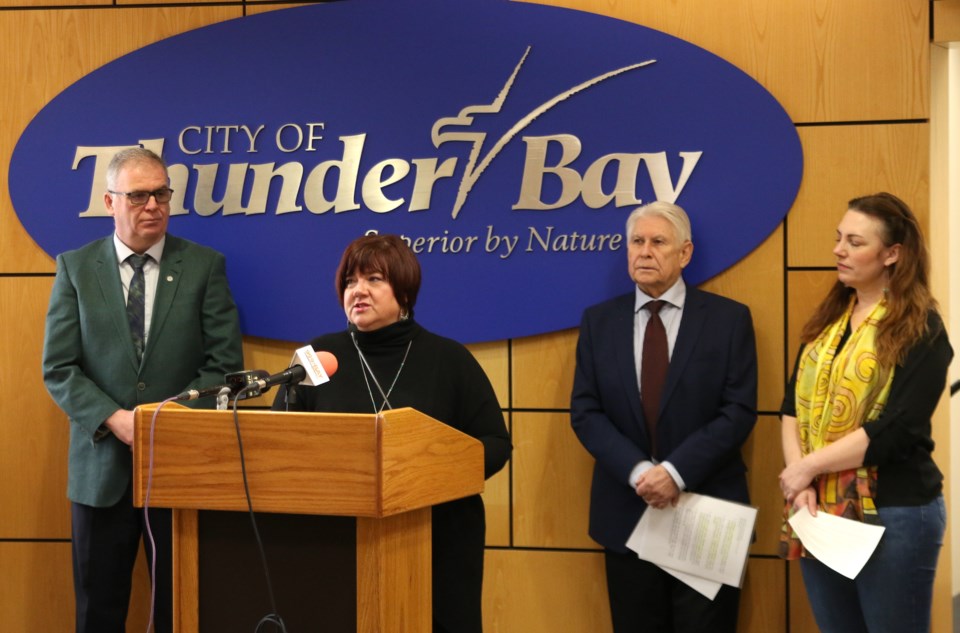THUNDER BAY — Numerous topics were brought forward to provincial ministers by local officials at this year’s Rural Ontario Municipal Association Conference, with the need for a mental health and addiction crisis centre taking centre stage.
“This situation and this issue is front and centre in most communities,” said Coun. Kristen Oliver, who is also chair of the city's intergovernmental affairs committee.
“We heard it time and time again, it is a top priority for the majority of communities in Ontario, dealing with the opioid crisis, the mental health issues on the streets and in their shelters, recognizing that we all have to collaboratively work together and find solutions on how we help people in all of our communities.”
The Thunder Bay delegation recently returned from the 2023 ROMA Conference that was held in Toronto this week.
During the conference, meetings were held with various provincial ministers on topics relating to a proposed mental health and addiction centre in the city, the Northern Ontario Heritage Fund and Pool 6 enhancement project, funding for the 2024 Ontario Winter Games, and the Thunder Bay Expressway Project.
And while violent crime involving gangs and firearms is also top of mind, no meetings were held, but it was not for a lack of trying.
Prior to the conference, meetings were requested with ministers regarding guns and gangs but it is at the discretion of the ministry if a meeting can be arranged.
“It doesn’t mean these conversations are not continuously ongoing with every opportunity we can through other avenues,” Oliver said. “While we didn’t particularly discuss that at this meeting, it is an ongoing discussion we are having with the ministry.”
Mayor Ken Boshcoff also met to discuss a content requirement for the Thunder Bay Alstom plant.
“We are asking the province ensure there is a final assembly requirement for these large rolling stock purchases and that maintenance contracts are not considered part of that content requirement,” Boshcoff said.
The most pressing issue brought to the table was the need for a mental health and addiction centre in the city.
Oliver met with Michael Tibollo, the province's associate minister of mental health and addictions, and the Ministry of Health.
According to Oliver, Tibollo was very engaged in the conversations and committed to following up with the city regarding programming and strategies to help people in vulnerable situations.
However, the majority of communities across the province are raising similar issue,s and as Oliver said, all looking for a piece of the funding pie.
“As more communities are trying to divvy up that pie, the pieces get smaller and smaller,” she said. “The minister expressed some concern that he does not have capital dollars and part of our ask was $34 million to get a crisis centre built in Thunder Bay.”
Oliver added that what sets Thunder Bay apart from most of the other communities is that there is a strategy in place to move forward with a crisis centre and it will be important to continue to identify targets and strategies that outline what the funding will do.
“Asking the province to throw money at the problem isn’t going to get us anywhere, but recognizing that we do have strategies in place, hopefully at some point those dollars will continue to flow,” Oliver said.
In the meantime, Oliver said the city will need to look at other avenues to bring a crisis centre to the city, which would not only assist individuals experiencing mental health and addiction issues, but also alleviate pressure on the health care system, particularly emergency departments.
“I think what my recommendation will be is that we change tactics and start going after Ministry of Infrastructure, perhaps Ministry of Health directly and recognize that this is a health care crisis and there needs to be some ownership from the Ministry of Health and working collectively with the Ministry of Infrastructure to see if we can have some money earmarked for these kinds of programs,” Oliver said.
